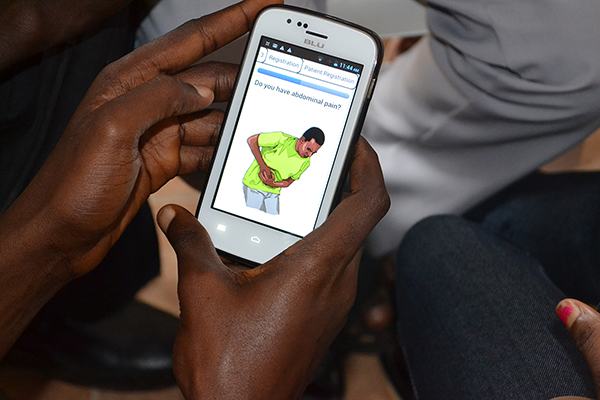World Health Organization (WHO)
See the following -
HealthMap Co-Founder And Prominent Epidemiologist Dr. John Brownstein To Deliver Keynote At 2014 mHealth Summit Focused On Ebola Outbreak, Epidemics And Public Health Surveillance
The mHealth Summit today announced that John Brownstein, PhD...Co-Founder of HealthMap, will deliver a keynote address at the 6th annual Summit on December 10...HealthMap is a global leader in using online informal sources for disease outbreak monitoring and real-time surveillance of emerging public health threats...The HealthMap software spotted the West African Ebola epidemic nine days before the World Health Organization (WHO) announced it, triggering a global response. Read More »
- Login to post comments
HealthMap Tracks Ebola’s Footprints Online, Preparing For The Next Big Outbreak
Since March, a group of data-savvy epidemiologists at Boston Children’s Hospital have watched Ebola slowly spread through West Africa, ominously lighting up their dials first as a trickle, then a torrent of mentions on social media and online news reports. The group, HealthMap, has been steadily ahead of the curve tracking this year’s outbreak. One day, they hope to be a step ahead of the next big disease...
- Login to post comments
Hepatitis C Drug Costing VA, DoD Millions
One of the costliest drugs on the market threatens the Veterans Affairs Department's health budget — to the point that VA, which added the medication to its formulary in April, provides it to only the sickest patients who need it...
- Login to post comments
Here's Why Africa's Ebola Epidemic Is Officially 'Spiraling Out of Control'
Health authorities admitted Tuesday that the West African Ebola virus epidemic is accelerating quickly and may soon outpace the ability of medical teams to contain it. Meanwhile, the grim situation is being made worse by a massive strike among Liberian health care workers, who have accumulated large amounts of unpaid wages while suffering from overwork and the constant risk of exposure...
- Login to post comments
Here’s How Researchers In Boston Spotted The Ebola Outbreak Before The World Health Organization
On March 23 the World Health Organization announced there was an Ebola outbreak in Guinea. But a team of researchers four thousand miles away in Boston already knew that...
- Login to post comments
Hesperian Health Guides Releases Open Copyright Apps
 Hesperian Health Guides released the Android version of their Safe Pregnancy and Childbirth app Friday, completing the new suite of free digital tools Hesperian made available in late February. These new digital tools, which were developed by Hesperian in partnership with The UnaMesa Association, are designed to provide community health workers worldwide with quick medical references and source content for training. The new digital tools suite consists of the Pregnancy and Safe Childbirth Application, a searchable HealthWiki, and an online image library. Read More »
Hesperian Health Guides released the Android version of their Safe Pregnancy and Childbirth app Friday, completing the new suite of free digital tools Hesperian made available in late February. These new digital tools, which were developed by Hesperian in partnership with The UnaMesa Association, are designed to provide community health workers worldwide with quick medical references and source content for training. The new digital tools suite consists of the Pregnancy and Safe Childbirth Application, a searchable HealthWiki, and an online image library. Read More »
- Login to post comments
Hesperian’s Mobile App Featured On Public Radio
Hesperian’s mobile app, Safe Pregnancy and Birth, was featured on the Bay Area’s KQED public radio this morning. Read More »
- Login to post comments
How Antibiotic Pollution Of Waterways Creates Superbugs
 Humans pollute the world with many chemicals and some of these affect living things, even at very low concentrations. Endocrine-disrupting compounds, which interfere with hormones, are a good example, but recently more concern has been raised about pollution with antibiotics. The problem is that up to 80% of an antibiotic dose passes straight through the body. So most of the antibiotics used in medical treatment or during animal production may end up in waste water. And waste treatment plants generally don’t remove antibiotics very well. Antibiotic pollution also comes from spreading manure on crop land, or using sewage as fertilizer. Waste water released from hospitals and antibiotic production plants is another major source.
Humans pollute the world with many chemicals and some of these affect living things, even at very low concentrations. Endocrine-disrupting compounds, which interfere with hormones, are a good example, but recently more concern has been raised about pollution with antibiotics. The problem is that up to 80% of an antibiotic dose passes straight through the body. So most of the antibiotics used in medical treatment or during animal production may end up in waste water. And waste treatment plants generally don’t remove antibiotics very well. Antibiotic pollution also comes from spreading manure on crop land, or using sewage as fertilizer. Waste water released from hospitals and antibiotic production plants is another major source.
- Login to post comments
How Google Plans to Reinvent Healthcare
Glucose-monitoring contact lenses for diabetics, wrist computers that read diagnostic nanoparticles injected in the blood stream, implantable devices that modify electrical signals that pass along nerves, medication robots, human augmentation, human brain simulation -- the list goes on. That's not an inventory of improbable CGI effects from the latest sci-fi movie, it's a list of initiatives being tackled by Alphabet's Google Life Sciences research unit, recently rebranded Verily...
- Login to post comments
How Open Source Mobile Health Technology Aided Ebola Response
 When the Ebola epidemic spread across West Africa in early 2014, organizations around the world sent thousands of health workers to combat the outbreak alongside local medical personnel and volunteers. Over the past two years, many of these teams have seen the benefits of using mobile health technology for disaster response. Some of the most important tasks in responding to a healthcare disaster are collecting, analyzing, sharing and acting upon data gleaned from patients. That was one job of Partners in Health (PIH), a nonprofit based in Boston, which worked in the affected countries to train medical staff, provide patient care, and survey patients and their families.
When the Ebola epidemic spread across West Africa in early 2014, organizations around the world sent thousands of health workers to combat the outbreak alongside local medical personnel and volunteers. Over the past two years, many of these teams have seen the benefits of using mobile health technology for disaster response. Some of the most important tasks in responding to a healthcare disaster are collecting, analyzing, sharing and acting upon data gleaned from patients. That was one job of Partners in Health (PIH), a nonprofit based in Boston, which worked in the affected countries to train medical staff, provide patient care, and survey patients and their families.
- Login to post comments
How OpenMRS is Used to Fight Malaria in Endemic Areas
 Children receiving care at a health clinic using OpenMRS in rural Uganda. Statistics from the Ministry of Health show that malaria is still the leading cause of death in Uganda, accounting for over 27% of deaths. OpenMRS is an electronic medical record platform designed to be used in low-resource environments where malaria and many other deadly diseases are endemic such as Uganda, where malaria is the primary cause of death in children. OpenMRS is currently used in over 1,800 medical clinics in 64 countries, providing the health information technology infrastructure that is foundational to over 6.3 million patients...
Children receiving care at a health clinic using OpenMRS in rural Uganda. Statistics from the Ministry of Health show that malaria is still the leading cause of death in Uganda, accounting for over 27% of deaths. OpenMRS is an electronic medical record platform designed to be used in low-resource environments where malaria and many other deadly diseases are endemic such as Uganda, where malaria is the primary cause of death in children. OpenMRS is currently used in over 1,800 medical clinics in 64 countries, providing the health information technology infrastructure that is foundational to over 6.3 million patients...
- Login to post comments
How the Trump Budget Undercuts Security Risks Posed by Pandemics
 President Trump proposed a US$54 billion military budget increase to solidify the security of our nation. However, the government also recognizes pandemic threats as an issue of national security – one that knows no borders. In the last four years, we have faced the Ebola epidemic – contained after significant loss of life – and Zika, which is still not contained. Collectively, we will feel these effects for a generation, while children born with Zika-related defects and their families will feel the effects every day of their lives...
President Trump proposed a US$54 billion military budget increase to solidify the security of our nation. However, the government also recognizes pandemic threats as an issue of national security – one that knows no borders. In the last four years, we have faced the Ebola epidemic – contained after significant loss of life – and Zika, which is still not contained. Collectively, we will feel these effects for a generation, while children born with Zika-related defects and their families will feel the effects every day of their lives...
- Login to post comments
How We Made a Health App That Works in Remote Rural Areas without Internet
Over half a century ago, communications guru and public intellectual Marshall McLuhan predicted that electronic interdependence will make the world a global village. But last month, Simon Tisdall of The Guardian called out the international media for creating a hierarchy of suffering by focusing on Hurricane Harvey more than on the devastating floods in South Asia and South East Asia. The reason: distance! The distances that marginalize are not just physical. They manifest in governance gaps in justice, cultural atrophy and social dystopia. Nowhere is the tyranny of distance more manifest than in health care delivery. And the Himalayan state of Uttarakhand has the double burden of a hilly terrain along with metaphorical distances to bridge...
- Login to post comments
I Caught Ebola In Guinea And Survived
The number of people who have contracted the Ebola virus in Guinea, according to the World Health Organization, has risen to 208 - and 136 of them have died. About half of these cases have been confirmed in a laboratory - earlier cases were not tested. Read More »
- Login to post comments
IBM updates open-source Big Data disease modeling platform
The rise of electronic health records (EHRs) is cutting the time it takes to spot changes in incidence of disease... Read More »
- Login to post comments